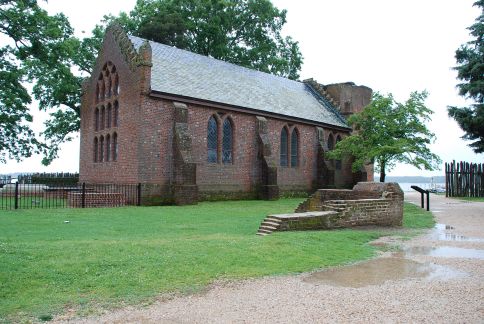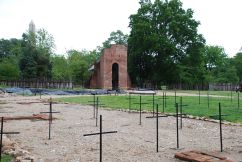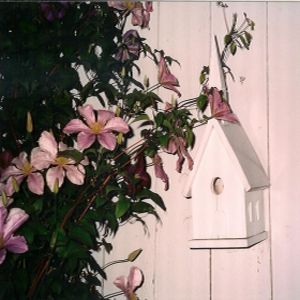
~ Vicki's Blog ~
-- Welcome -- About Me -- Fiction -- Non-Fiction -- Poetry -- Inspirational -- Young Adult -- Kids -- Awards --
-- View -- Memoir -- My Garden -- Flowers -- Tea Time -- Photos -- Faq -- Blog -- Store -- Links --

Posted May 1, 2010

I remember the days when all stores were closed on Sundays. It was a peaceful time when shoes were polished
the Saturday night before going to church, clothes were chosen ahead of time to make Sunday mornings run smoothly, and
the Sunday lesson or Bible reading was studied in preparation for the Sunday School class. Then after church, Mother
always cooked Sunday dinner. The meal was usually fare that had been partially prepared beforehand so it wasn't labor
intensive. The rest of the day was spent resting, reading, or visiting with friends and family. I think about those easy going
halcyon days of sitting on someone's front porch relaxing or lying on a quilt beneath a shade tree, reading a good
book and feeling a cool breeze on my face every now and then. I miss the Sunday simplicity the forefathers of
our great nation instilled upon us.

One of the first church services in America was at Jamestown beneath an old sail. A wooden church was built which burned. A brick church was built with more fire destruction. Finally, a 17th century tower was saved from fire and additions added once again. Church attendance back in the day was mandatory. It was a time when community came together. God was glorified.
Alas, those days of stores being closed on Sundays are gone. Sunday is just another work day. And most people are bone tired from the rat race since a lot of the blue laws are no longer honored.
The Reverend Samuel Peters (1735–1826) is associated with the first usage of the term blue law. In his 1781 book General History of Connecticut, he used the term to describe various laws first enacted by Puritan colonies in the 17th century. These laws prohibited certain business activities on specific days of the week (usually Sunday). Sometimes, merchandise of certain types were prohibited to be sold, and in some cases all retail and business activity were denied. Later, the South and many Midwestern states would also establish their own blue laws, one being no stores open on Sunday in the South.
I recently received a post from literary agent Chip MacGregor and thought I would post a partial here - Keri Wyatt Kent's thoughts - since it's so relevant to writers. Thanks, Chip, for posting these words.
"Sabbath. Most writers do not go to an office to work. We carry a notebook and furtively scribble in it when thoughts or images come to mind. We sit in coffee shops in or in the spare bedroom and pound out words on the computer. Hence, we’re easily tempted to work 24-7. Our lives are unframed by trivialities like a calendar. However, if we never rest, our reservoir of words will run dry. We need to honor God by keeping the Sabbath.
"In nearly two decades of Sabbath-keeping, and being a professional freelance writer during those same decades, I’ve found that there is a beautiful mystery when we honor God by obeying his command to take a day of rest.
"You may be worried that taking a day off will put you further behind. But Sabbath actually has the opposite effect. In the weeks that I don’t write on Sunday, my overall production (measured by words written, articles finished, whatever) is higher than it is on the weeks I don’t stop. And on Mondays, after a day of rest, my productivity soars.
"During World War II in England, a factory conducted a productivity study. Workers were put on a schedule of working twenty-one days in a row, then having a several days off, and their productivity measured. Then, by way of comparison, the workers were put on a six-days-on, one-day-off schedule. On each schedule, the number of days worked was the same. Yet when they got to take one day off per week, their productivity doubled. God gave the command for Sabbath because he made us and knows how we would function optimally.
"Writer Cec Murphey has found this productivity principle to be true in his life. (I tell his full story in my
book Rest: Living in Sabbath Simplicity). Cec is a prolific writer, having written or co-written 104
books and more than 700 articles. He makes his living primarily as a ghostwriter, taking other
people’s ideas and shaping them into books. He’s taught at over two hundred writers’ conferences.
At seventy-four, he still works full-time and has no plans to retire. For most of his life, Cec says,
he was a bit of a workaholic, even in seemingly spiritual careers as a missionary, pastor, teacher,
and author. Today, he’s still very driven and highly disciplined. But he’s found that he’s a much
happier man, and no less productive than before, now that he has incorporated the practice of
Sabbath rest into his life.

"At first, Cec could not even conceive of taking a whole day off from work. So, he started gradually, with just taking one or two hours after church to simply do nothing, to relax. 'After a while, I gradually made it three hours, then four,' he laughs. Now he understands that value of keeping a Sabbath, and gets more done by taking time away from writing.
"Build the practices of community, inspiration and Sabbath into your life, and you’ll find that your soul, and your writing, will flourish."
-Keri Wyatt Kent